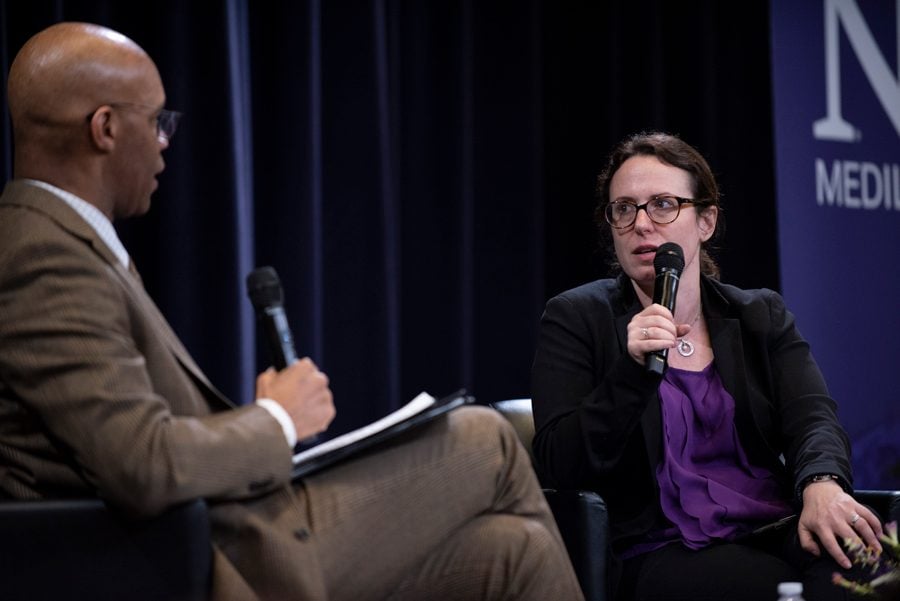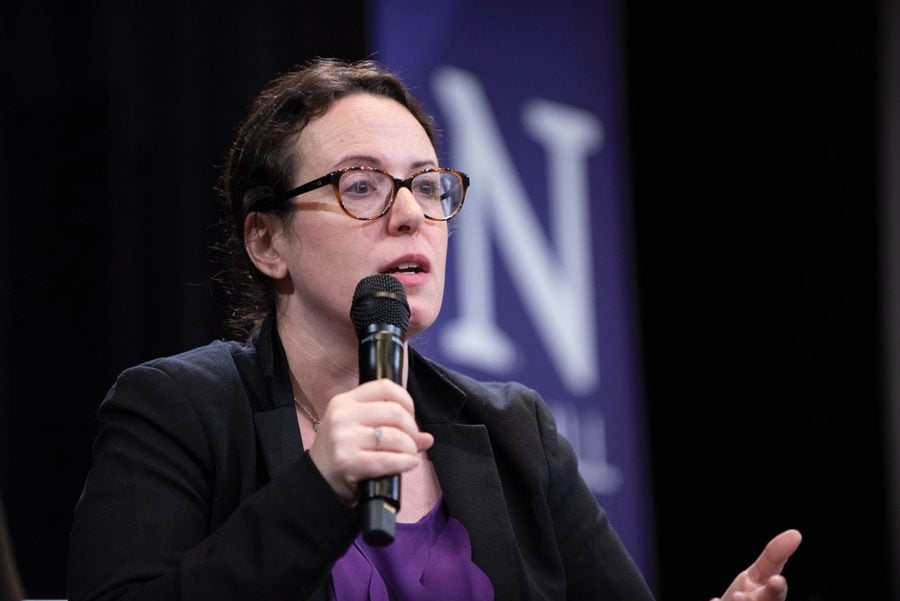White House correspondent Maggie Haberman discusses journalism in the age of Trump
Colin Boyle/Daily Senior Staffer
New York Times White House correspondent Maggie Haberman speaks at an event Thursday. Haberman emphasized the need for strong local news and truthful political reporting.
April 12, 2019
New York Times White House correspondent Maggie Haberman doesn’t ever have a “typical” day. In the hectic Trump administration news cycle, she splits her time between New York and Washington, keeping up with breaking news that develops at breakneck speed.
In the 24-hour news cycle, Haberman is practically attached to her phone and email, and she’s had to take “more and more forced breaks” away from them.
One such break came Thursday night, when she spoke to a crowd of roughly 100 Northwestern students, faculty and Evanston residents at an event hosted by Northwestern Hillel.
The event, which was held at the McCormick Foundation Center and co-hosted by the Medill School of Journalism, Media, Integrated Marketing Communications, consisted of a discussion moderated by Medill Dean Charles Whitaker and a Q&A session.
Whitaker began by asking Haberman how she became such a key figure in journalism; last year, she won a Pulitzer Prize for her reporting on President Donald Trump’s potential connections to Russia. Her response was unexpected.
“I did not want to be a journalist,” Haberman replied.
Haberman said her experiences growing up with her journalist father, who was constantly working, turned her away from the field — despite her innate desire to write. She graduated from Sarah Lawrence College with a degree in English and creative writing. But at her first job working on the New York Post’s copy desk, she was given weekly opportunities to write. After reporting on city hall, she said she was “hooked.”
Haberman said she wrote for other publications — like the New York Daily News and Politico — before beginning to report for the New York Times in 2015, where her work has focused on Trump’s candidacy and early presidency.
In an interview with The Daily, Haberman said Trump has effectively “poured accelerant on an already sped-up news cycle.”
“This president has shattered a lot of norms related to how our democracy has functioned,” Haberman said. “And I think his election has been a reminder to a lot of people that our system is largely norms and not laws.”
These shifting norms have come at a time when Trump has taken aim at the press — particularly the New York Times, an organization which he has repeatedly called “the enemy of the people.”

Charles Whitaker and Maggie Haberman.
SESP sophomore Jacob Jordan, who attended the event, said he considers journalism to be a safeguard for democracy, adding that he has made sure to follow journalists like Haberman on Twitter.
“I want to hear how factfinders like herself are defending themselves against the largely baseless attacks,” Jordan said. “It’s essential that we have a free and accurate press in order to check the actions of rulebreakers, such as our president.”
Haberman received several audience questions about her experiences dealing with the president and the backlash the Times has received from him.
“To Trump, the Times represents the elites who don’t approve of him,” Haberman said. “But I think this is actually a great time to be a political reporter.”
She said that holding public figures accountable has never been as important as it is now — both on a local and national level.
Haberman said that when she first started reporting in the late 1990s, the newspapers she wrote for focused more on state and local politics and less on federal issues. Now, she said that has reversed.
“National news can’t fill the void of local reporting,” Haberman said. “Local journalism is vital and essential to a working democracy.”
Haberman added that while this presidential administration has provided many stories to pursue, The Times is reconsidering how pervasive their coverage should be. She said too much reporting on Trump can lead the public to minimize individual stories’ importance.
Medill first-year Virginia Langmaid said she appreciated Haberman’s success story.
“Journalism can be such a drag, so it’s nice to go to events and see there’s a light at the end of the tunnel,” said Langmaid. “There are people who actually did this and now have a career doing what they wanted to do.”
Kristina Karisch contributed reporting.
Email: [email protected]
Twitter: @bonijos_iahfant
Related Stories:
– Obama press secretary and speechwriter speculate on 2020 presidential nominee, talk future of political landscape
– New York Times columnists discuss the virtue of thinking differently


